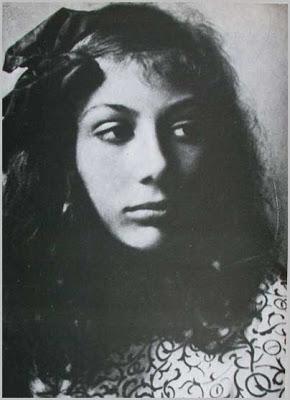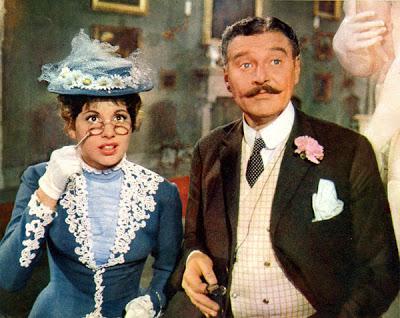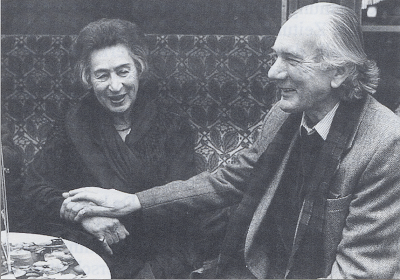'David. S. Luft’s evocative translations in Hugo von Hofmannsthal and the Austrian Idea: Selected Essays and Addresses 1906-1927 are a welcome addition to the lost literature of Central European modernism.'
From Strange Flowers: 'Trakl was born in Salzburg in 1887, his mother’s drug addiction meaning he was largely raised by a French nanny. Named Marie Boring, she was clearly anything but, introducing her young charge to poets such as Baudelaire and Rimbaud.'
More from Strange Flowers: Alfred Kubin took 'anti-industrialist visionary ideologies' and 'stretch[ed] them ad absurdum'. Kubin's entry at the Weird Fiction Review.
Abstract for an article by Genese Grill: 'Robert Musil’s 1937 address «Über die Dummheit» ['On Stupidity'] navigated a challenging subject in a treacherous climate for free speech and simultaneously affirmed Musil’s conception of the necessary symbiosis of aesthetics and ethics. This paper argues for a reading of the address and its preparatory notes wherein Musil’s gendered «Stupidity» (Die Dummheit) represents the ethical role of the artist, as poetic, non-conscripted voice – and, thus, of Musil himself – in a period of totalitarian brutality.'

Wera Ouckama-Knoop (1900-1919)
Source of above photo. Wera Ouckama-Knoop was a dancer who died young. Rilke, a friend of her parents, dedicated his Sonnets to Orpheus to her.Adam Kirsch on a new translation of Hilda Spiel's biography of Fanny von Arnstein: 'It soon becomes clear, however, that Fanny von Arnstein is more the occasion for Spiel’s book than its subject. That subject is really the experience of the Jews during the German Enlightenment—say, between 1776, when the 18-year-old Fanny moved from her native Prussia to Austria, and 1814, the year of Napoleon’s downfall, when her house became one of the most glamorous meeting-places during the Congress of Vienna.'
From the publisher's site for the von Arnstein biography: 'Soon Fanny hosted an ever more splendid salon which attracted the leading figures of her day, including Madame de Staël, the Duke of Wellington, Lord Nelson, his lover Lady Hamilton and the young Arthur Schopenhauer.'
From Weird Fiction Review, Larry Nolen on Bruno Schulz: 'The dissolution of states at the end of World War I can be discerned in symbolic form, as the old order has collapsed and something new and chaotic has emerged to take its place. Yeats in “Easter, 1916” might have proclaimed that a “terrible beauty is born,” but for Schulz there is more the sense of monstrosities being birthed.' From the same site, John Curran Davis' translation of Schulz's 'The Sanatorium at the Sign of the Hourglass'.
From Jacob Mikanowski's 2012 piece on Schulz in the LA Review of Books: 'The fiction of Bruno Schulz is alive with dead things. His stories all take place in the narrow landscape of his childhood: the small, provincial town of Drohobycz in what was then the Austro-Hungarian Empire.'
Gregor von Rezzori on his roots (from a 1988 interview in Bomb Magazine): 'I was born in Bukovina, Rumania. Before Rumania went into the war it was given to the Russians so I was already more or less a Russian although I still had a Rumanian passport and was living in Vienna at that time. When Bohemia was taken by the Russians I went to our ambassador in Berlin, who was a friend of the family, and I said, “What shall I do, what am I supposed to do?” He said, “Well, you are supposed to go home and find a new identity because you don’t exist."'

Rezzori (as Sir Roderick Crawford) with Johanna von Koczian in Bezaubernde Arabella (1959)
Source of above image. Rezzori's filmography at IMDb.From Gregg Morris' review of Rezzori's Orient-Express: 'Rezzori is one of those unfashionable intellects whose rootlessness lead him to universalism rather than rancor. Though he now resides in Tuscany, he has published most of his work in German. During the Second World Was he was a broadcaster for British radio and parts of what is perhaps his best-known work, Memoirs of an Anti-Semite, he composed in English.'
From last year's item (by Lorna Scott Fox) on Rezzori in The Nation: 'Von Rezzori’s father was an Italo-Austrian nobleman, proficient in chemistry and the arts, with a sinecure in Bukovina, where after 1919, when the region passed to Romania, he pretended to uphold a teetering bastion of civilization but really stayed on for the hunting.'
Scott Walters on the English translation of Count Miklós Bánffy's Transylvanian Trilogy: 'Translator Patrick Thursfield, in his preface to the Arcadia edition, recounts learning about them by chance from his neighbor in Tangiers, Bánffy’s daughter Katalin Bánffy-Jelin, who had begun an English translation consisting of loosely bound pages partially mangled by her cat. A collaboration began, and the resulting publication, with a foreword by Patrick Leigh Fermor, won the 2002 Oxford-Weidenfeld prize.'
Andrew Cusack on Bánffy, 'The Tolstoy of Transylvania'. The 2010 entry on Bánffy at Neglected Books. From Max Egremont's 2013 review in the Wall Street Journal: 'Bánffy died destitute in Soviet-dominated Budapest in 1950. His life is a grim parable of central Europe's 20th century.'

Hilde Spiel & Thomas Bernhard (1988)
The source of the above photo has a translation of Spiel's impressions of her friendship with Bernhard.A note on Jay Kirk's new article 'Bartók’s Monster' (in the Oct. issue of Harpers), which is about the Transylvanian roots of some of Bartók’s music: 'The tiny, teetotaling Bartók took his recording machine—the monster—across the sheep trails and into village courtyards of Maramureş and Székely Land, where he would “suck the songs” from the peasant fiddlers. He was entranced by the "indeterminate content structure” of the music. “Like Rumpelstiltskin,” writes Kirk, “he hurried back to Budapest to spin the bales of itchy straw into chaotic threads of Lydian gold.”'
'In Erwin Schrödinger and the Quantum Revolution, biographer John Gribbin follows the thread through the Austrian physicist’s fascinating, often eyebrow-raising life alongside scientific milestones.'
'Erich Wolfgang Korngold, born on 29 May, 1897 in Brno as the younger son of fierce Neue Presse music critic Julius Korngold, was a Wunderkind and shooting star of the declining Austro-Hungarian Monarchy. ... He left for Hollywood, to write first for Max Reinhardt and then under contract for Warner Brothers, a true musical “Romantic”, who is credited with creating the Hollywood sound.'
